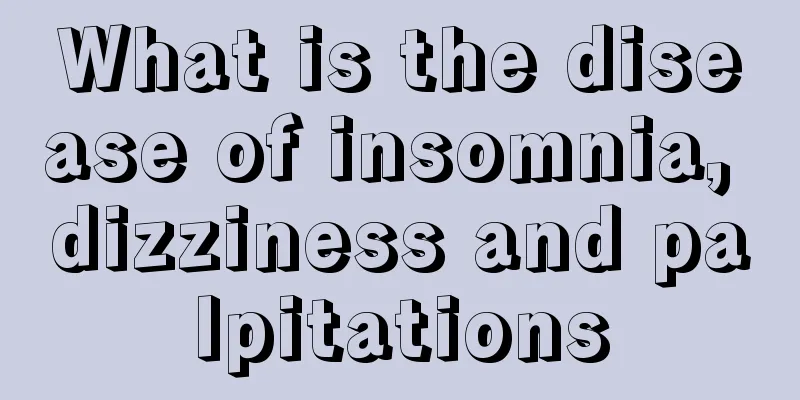What is the disease of insomnia, dizziness and palpitations

|
It is very common for people to develop diseases in their daily work and life, because many factors in life can cause the occurrence of diseases, among which insomnia, dizziness and palpitations are common conditions. Many patients with insomnia, dizziness and palpitations do not know what caused the disease and how to treat it. So, what is insomnia, dizziness and palpitations? First, what disease is insomnia, dizziness and palpitations? Insomnia caused by physical illness: The physical diseases that cause insomnia include heart disease, kidney disease, asthma, ulcer disease, arthritis, bone and joint disease, gastrointestinal disease, hypertension, sleep apnea syndrome, hyperthyroidism, nocturnal myoclonus syndrome, brain disease, etc. Whether it is difficulty falling asleep (still cannot fall asleep 30 minutes after going to bed), easy waking up during sleep, or waking up too early, and after getting up there is fatigue, confusion, headache, dizziness and other discomforts, and the symptoms last for a long time, even affecting school and work, can be diagnosed as insomnia. At present, insomnia has gradually developed into an urban "epidemic". According to the data from the 2002 Global Sleep Survey in China, the number of people suffering from insomnia is as high as 42.7%. At present, insomnia has become the second most common disease in neurology outpatient clinics in China after headache. Second, based on symptoms, insomnia can be divided into three types: difficulty falling asleep, inability to maintain deep sleep, and early awakening. If calculated by the duration of insomnia, it can be divided into transient insomnia (less than one week), short-term insomnia (one week to one month) and chronic insomnia (longer than one month). In addition, insomnia can be divided into physiological insomnia, psychological insomnia, pathological insomnia and drug-induced insomnia according to the cause. Physical illness (such as asthma, joint pain, sleep apnea), environmental factors (light, noise, room temperature) and jet lag can all trigger physical or physiological insomnia. Anxiety, academic and work setbacks, the death of loved ones, neurasthenia, depression, etc. are also the main causes of psychological and pathological insomnia. Certain drugs, such as the diet drug amphetamine, can cause central nervous system excitement and lead to insomnia. People who have taken sleeping pills for a long time will also experience withdrawal symptoms such as shallow sleep and more nightmares once they quit taking them. Some people even have too high expectations for sleep, thinking that as long as they sleep well they will be free from all diseases, but if they don't sleep well they will have health problems. This increases the pressure of sleep and is more likely to cause insomnia. What is the disease that causes insomnia, dizziness and palpitations? According to some insomnia research surveys, people who have too high self-demands, live too strictly, are taciturn, emotional or have a strong sense of inferiority are prone to insomnia. On the other hand, people who are open-minded, cheerful, and not demanding of others and themselves are less likely to suffer from insomnia. Although experiments on mice have found that mice deprived of sleep for more than six days will show symptoms of movement disorders, and as the sleep deprivation period increases, the voltage of brain waves will drop or disappear, and even death may occur; however, in human experiments, the results of sleep deprivation experiments have shown that even long periods of sleep deprivation (more than ten days) will not be fatal; because even if a person is forced not to sleep, the brain will still betray the person's consciousness and sleep secretly. However, not sleeping for a long time can make people extremely tired, mentally and physically exhausted, become easily angry, anxious and irritable, suffer from memory loss and inability to concentrate, etc. Therefore, the biggest impact is on the mental aspect, but severe cases can still lead to schizophrenia. |
<<: Will insufficient qi and blood cause insomnia?
>>: What is the reason for insomnia
Recommend
Beware of misunderstandings in glioma treatment
Among the incidence rates of tumors throughout th...
What is the chance of inheriting bone cancer?
Bone cancer is the most painful cancer for patien...
What is the reason for shaking hands when picking up food
In daily life, our bodies often have some minor p...
What cigarette has low tar content?
Cigarettes have gradually become an indispensable...
Is new furniture toxic?
I believe that for many young friends working har...
What causes eye fatigue and dryness?
The eye is one of the most important sensory orga...
Is fasting blood sugar 59 normal?
If your blood sugar is 59 when you are fasting, y...
What is the difference between eczema and prickly heat
Eczema and prickly heat can easily affect childre...
What are the common prevention points for small cell lung cancer?
Many patients with small cell lung cancer do not ...
Does a ruptured eardrum hurt? Causes of ruptured eardrum
In otolaryngology clinics, ruptured eardrums are ...
How long does it take for a broken hand bone to heal
There are more than two hundred bones in the huma...
Why are obese men more likely to get prostate cancer
Fat not only wraps your body thickly, but also hi...
Will gastritis cause right abdominal pain?
Gastritis is a very common stomach disease in lif...
How to deal with cutting your finger while cutting vegetables
Cutting your fingers while cutting vegetables is ...
How long after teratoma surgery can I drink water
You can drink a small amount of water 6 hours aft...









